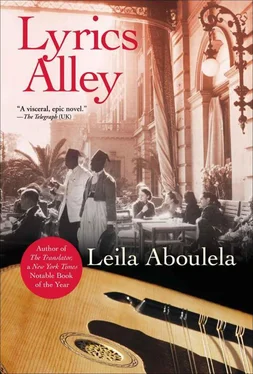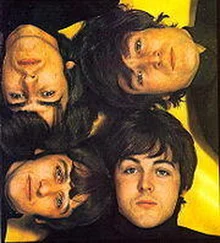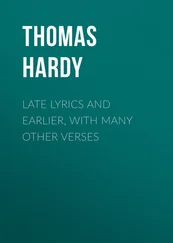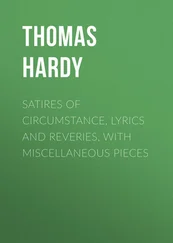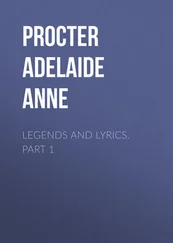Leila Aboulela - Lyrics Alley
Здесь есть возможность читать онлайн «Leila Aboulela - Lyrics Alley» весь текст электронной книги совершенно бесплатно (целиком полную версию без сокращений). В некоторых случаях можно слушать аудио, скачать через торрент в формате fb2 и присутствует краткое содержание. Год выпуска: 2011, Издательство: Grove Press, Жанр: Современная проза, на английском языке. Описание произведения, (предисловие) а так же отзывы посетителей доступны на портале библиотеки ЛибКат.
- Название:Lyrics Alley
- Автор:
- Издательство:Grove Press
- Жанр:
- Год:2011
- ISBN:нет данных
- Рейтинг книги:5 / 5. Голосов: 1
-
Избранное:Добавить в избранное
- Отзывы:
-
Ваша оценка:
- 100
- 1
- 2
- 3
- 4
- 5
Lyrics Alley: краткое содержание, описание и аннотация
Предлагаем к чтению аннотацию, описание, краткое содержание или предисловие (зависит от того, что написал сам автор книги «Lyrics Alley»). Если вы не нашли необходимую информацию о книге — напишите в комментариях, мы постараемся отыскать её.
Lyrics Alley — читать онлайн бесплатно полную книгу (весь текст) целиком
Ниже представлен текст книги, разбитый по страницам. Система сохранения места последней прочитанной страницы, позволяет с удобством читать онлайн бесплатно книгу «Lyrics Alley», без необходимости каждый раз заново искать на чём Вы остановились. Поставьте закладку, и сможете в любой момент перейти на страницу, на которой закончили чтение.
Интервал:
Закладка:
Today, as he walked forward to pray in the front row, his wet bare feet treading grass, he sensed the congregation swelling with invisible worshippers. So palatable was their presence that it was as if the barrier separating their world from that of mankind had thinned and become transparent. Were they angels, robust and pure, better than him because they never despaired and never tired? Badr felt himself slide into another dimension. It was unexpected and unasked for. A dip into an alternative state, where he was weightless and free, and his concerns, valid and pressing only minutes ago, slackened and moved away. They did not disappear, but receded to the back of his mind as if they were taking a rest. The imam, in his recitation, stumbled over a verse, and Badr, standing right behind him prompted the correct words. This gladdened him; he had made sure that Allah’s words were recited in the correct order. He was a teacher, after all, and his role was to demonstrate and correct. He felt himself elevated, his presence appreciated by all who were present — men, angels and jinn.
Afterwards, he wanted to ask the men who had prayed with him if they, too, had noticed what he had noticed, if they, too, had experienced that thinning of the barriers. He wanted to confirm that this was not an ordinary maghrib prayer, but one in which one or more of Allah’s powerful servants had participated. He was almost certain that inhuman creatures, who could neither be seen nor touched, had prayed too. And the reasons for this attendance, and the consequences of this attendance, he believed, were detached from ordinary day-to-day life. They were reasons and consequences of another realm that would not unsettle Badr’s life or anyone else’s. All that had happened was that two worlds, the spiritual and the material, had touched each other briefly before moving on, each faithful to its own orbit. It had been a privilege to bend in worship at this particular gathering. He was grateful. And it was this that finally restrained him from seeking confirmation with the other worshippers. The villager’s fear that flaunting good fortune, even if it were immaterial, would lead to envy. He kept his experience to himself and walked away from the garden and into the twilight.
If he had not visited Mahmoud Bey, he would have missed this; if Mahmoud Bey had spoken to him and given him good tidings about the flat, he would have dashed back home to Hanniyah. Everything happens for a reason. But Badr was an educated man and knew that coincidence existed too, randomness was created. It was one of the laws of the universe. Imagination existed, too. He could have been hallucinating or, Allah forbid, succumbing to a sickness of the mind. He could have conjured it all up to comfort himself after the disappointment he had experienced. No, his imagination was not that powerful, and he had never been prone to fancies before. It was this country. Something here was different. The twilight was thick with it, pungent and sensuous. He concluded that in Sudan, the barriers between the human and spirit worlds were thin, or that there were cracks and transparencies through which that other, unknown, world could, at times, be sensed.
In this heightened sense of awareness, he understood something of the events of seventy years ago. It was easy now to imagine how a man from the Jezira Abba, a place far west of Khartoum and even more backward than Umdurman, could imagine that he was the Mahdi himself, sent by Allah to fill the earth with justice and warn of an impending Judgment Day. In Badr’s opinion, which was the position of the Azhar and the Sudanese tribes who were allied to Egypt, Muhammad Ahmad al Mahdi was a charismatic, powerful impostor, misguided at best and an apostate at worse. The British had done well to end his state. The Sudanese needed rescuing from superstition and deviation — this was why the Shariah judges were Egyptian and why it was so important for Badr to be here, to teach Arabic and Religious Education. The Sudanese were good people, they loved the prophet Muhammad, peace be upon him, but they needed to learn more about his sunna so that they would stay strong and not follow individuals who would lead them astray like the Mahdi had done. Yet now, walking in the twilight, Badr gained insight into that man’s psyche and saw, all too clearly, that it was not only the oppression of Turkish-Egyptian rule that prompted the Mahdist rebellion, it was something in the very air and texture of Sudan itself. A place where reality was slippery and fantasy could take over the mind, a place of wayward spirituality, a place where the impossible and the romantic pulsed within reach. A place where intangible, inhuman, forces still prevailed, not yet tamed and restrained by the rules of religion and men.
His home was not far from the Egyptian school, but while the school was within the vicinity of downtown Khartoum, the houses allocated to the staff were on the muddy outskirts. There was no sewage system, only buckets that were collected and replaced at night by carts pulled by camels. The camel-cart must have passed and overturned not far from his door. He walked in, enveloped by the stench, jarred back to the feelings of disgust and injury. He opened the door onto the smallest of hoashs where four beds were arranged in a rectangle around a small table. He immediately looked for Shukry and was relieved not to find him. Hanniyah was preparing dinner in the strip of covered terrace that served as a kitchen. She was bent over, stirring something in a pot. His father sat cross-legged on one of the beds, hunched over, picking and fretting over his toenails. The children left their game of marbles and ran to greet Badr, three boys to shake his hand as they had been taught. He picked Radwan up, felt his forehead and tousled his hair, ‘Are you still coughing, boy?’
‘No, Father.’
There was mucous, dark green and thick, descending from his nose. Badr put him down. His suit had to last him all week, he could not go to school streaked with snot.
‘Where did your Uncle Shukry go?’
‘He went out to the prayer and didn’t come back,’ said Osama the eldest.
‘He went back to Egypt,’ said Bilal.
He was five, but spoke slowly, as if he were younger. Badr laughed and drew Bilal to him. The boys were stripped to their underwear — they only wore clothes when they went out. Osama was distracted by a blue and gold marble, which he tossed from one hand to the other. Badr had never seen it before.
‘Where did you get this marble from?’
‘I bought it from the shop.’
‘Where did you get the money from?’
‘Uncle Shukry gave me a piaster this morning.’ Osama closed his fingers over the marble.
Bilal reached out and pressed his father’s pockets to see if he had brought home anything. Sometimes he got them bubble gum or peanuts. Finding his pockets empty, the boys’ interest cooled and they went back to their game by the light of the lamp. The baby was asleep on one of the beds. If he rolled over, he would fall off. Badr propped a pillow behind his back before turning to greet his father.
He bent down to kiss the old man’s hand. ‘How are you, Father? How are you today?’ Whole days and nights would pass with the old man detached and confused. In this state, he even forgot he was in Sudan and spoke about feeding the water buffalos and milking the cow, as if the fields and canals of Kafr-el-Dawar were outside his door. He would also imagine that Badr’s sons were his own sons, and often address Osama as ‘Walla ya Badr’ or ‘Badr ya zeft’. This always sent Osama into a fit of harsh giggles, for it disturbed him to hear his father’s name, the name of a venerable Ustaz of Arabic language and religion, abused in such a way. If Osama laughed in front of Badr, Badr would give his shaking shoulders a slap to restore order in the household. Behind his back, though, he was sure the boys, and even Hanniyah, had their fair share of laughter at his father’s senility.
Читать дальшеИнтервал:
Закладка:
Похожие книги на «Lyrics Alley»
Представляем Вашему вниманию похожие книги на «Lyrics Alley» списком для выбора. Мы отобрали схожую по названию и смыслу литературу в надежде предоставить читателям больше вариантов отыскать новые, интересные, ещё непрочитанные произведения.
Обсуждение, отзывы о книге «Lyrics Alley» и просто собственные мнения читателей. Оставьте ваши комментарии, напишите, что Вы думаете о произведении, его смысле или главных героях. Укажите что конкретно понравилось, а что нет, и почему Вы так считаете.
